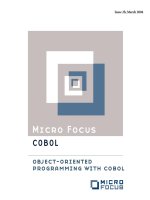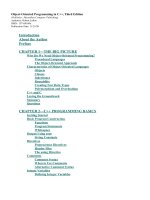Object oriented programming with C++ - Session 4 Operator Overloading potx
Bạn đang xem bản rút gọn của tài liệu. Xem và tải ngay bản đầy đủ của tài liệu tại đây (292.81 KB, 49 trang )
Object Oriented Programming with C++/ Session 4/ 1 of 49
Operator Overloading
Session 4
Object Oriented Programming with C++/ Session
4/ 2 of 49
Session Objectives
■
Describe Operator Overloading
•
Unary operators
•
Binary operators
•
Binary arithmetic operators
•
Compound assignment operators
•
Comparison operators
■
Describe overloading of the Assignment Operator
■
Describe Copy Constructors
Object Oriented Programming with C++/ Session
4/ 3 of 49
Session Objectives (Contd.)
■
Describe conversion functions which help in
conversion
•
from Basic types to User-Defined types
•
from User-Defined types to Basic types
•
between Objects of different Classes
■
Identify operators that cannot be overloaded
Object Oriented Programming with C++/ Session
4/ 4 of 49
Operator Overloading
■
It is the ability to associate an existing operator
with a member function and use it with objects of
its class as its operands
■
Expressions with operators like +, -, >, +=, ==,
etc. can be used only on basic data types like int
and float
■
Operator overloading allows statements like ,
if (obj1>obj2){ . . .}
where obj1 and obj2 are objects of a class.
Object Oriented Programming with C++/ Session
4/ 5 of 49
Operator Overloading(Contd.)
■
Operation of comparing the objects can be
defined in a member function and associated
with the comparison operator.
■
Compiler can distinguish between overloaded
operators by examining the data type of its
operators.
■
Operator overloading is one form of
polymorphism - operational polymorphism.
Object Oriented Programming with C++/ Session
4/ 6 of 49
Points to note
■
Overloading cannot alter the basic function of an
operator, nor change its place in the order of
precedence that is already defined in the
language.
•
++ (increment) and (decrement) can be used
only as unary operators.
•
an overloaded + operator can be used to
multiply two objects but this would make
your code unreadable.
Object Oriented Programming with C++/ Session
4/ 7 of 49
Advantage
■
Makes programs easier to read and debug.
■
Easy to understand that two objects are being
added and the result assigned to a third object, if
you use the syntax
obj3 = obj1 + obj2;
instead of,
obj3.addobjects(obj1,obj2);
Object Oriented Programming with C++/ Session
4/ 8 of 49
The Operator function
■
Operator function: Contains actual instructions
to overload an operator. The operator that has to
be overloaded follows the keyword "operator".
return_type operator op(argument list);
where op is the symbol for the operator that is being
overloaded.
Object Oriented Programming with C++/ Session
4/ 9 of 49
Unary Operators
■
Unary operators have only one operand.
increment operator ++, decrement operator , and unary minus
operator.
■
The increment and decrement operators can be used as
either prefix or postfix operations.
class Sample{
private:
int counter;
public:
Sample()
{counter =0;}
void operator++()
{++counter;}
};
Object Oriented Programming with C++/ Session
4/ 10 of 49
Unary Operators (Contd.)
void main()
{
Sample obj1;
obj1++; //increments counter to 1
++obj1; //increments counter to 2
}
•
If an operator function is found in the
class specifier, the statement to increment
the object obj1++;gets converted, by the
compiler to the following:
obj1.operator++();
Object Oriented Programming with C++/ Session
4/ 11 of 49
Unary Operators (Contd.)
■
A similar function to decrement the object can also be
included in the class as:
void operator ()
{ counter;}
•
Can be invoked with the statement
obj1;
or
obj ;
■
With the overloaded increment and decrement
operators, the operator function is executed first,
regardless of whether the operator is postfix or prefix.
Object Oriented Programming with C++/ Session
4/ 12 of 49
Unary Operators (Contd.)
■
Does not matter in obj1++ or ++obj1 but there is
a problem when obj1 = obj2++; is used.
■
Revise the function so that it is able to return an
incremented object.
Sample Sample::void operator++()
{
Sample temp; //create a temporary object
temp.counter = ++counter;
//assign incremented value
return temp; //return incremented object
}
Object Oriented Programming with C++/ Session
4/ 13 of 49
Using nameless temporary object
■
Another way is to create a nameless temporary
object and return it.
class Sample{
private:
int counter;
public:
Sample() //constructor with no argument
{counter = 0;}
Sample(int c) //constructor with one argument
{counter = c;}
Sample operator++();
};
Object Oriented Programming with C++/ Session
4/ 14 of 49
Using nameless temporary object (Contd.)
Sample Sample::void operator++()
{
++counter;
return Sample(counter);
//or only return Sample(++counter);
}
•
In the return statement, an unnamed
temporary object of class Sample is created
by the constructor that takes one argument.
The object is initialised with the value in
counter and the function returns the object.
Object Oriented Programming with C++/ Session
4/ 15 of 49
Using the this pointer
■
Yet another way of returning an object from the
member function is by using the this pointer.
Sample Sample::void operator++()
{
++counter;
return(*this);
}
•
The one argument constructor is not needed
in this approach.
Object Oriented Programming with C++/ Session
4/ 16 of 49
Problems with post and prefix
■
When ++ and are overloaded, there is no
distinction between the prefix and postfix operation.
The expressions,
obj2 = obj1++;
and
obj2 = ++obj1; produce the same effect.
■
Define the function with a single argument to
overload the ++ operator for a postfix operation
Sample Sample::void operator++(int)
{ dummy argument
return Sample(counter++);
}
Object Oriented Programming with C++/ Session
4/ 17 of 49
Binary Operators
■
Binary operators can be overloaded in two ways:
•
as member functions, they take one formal
argument, which is the value to the right of
the operator.
–
For example, when the addition obj1+obj2 has to
be done the overloaded operator function for + is
declared as,
operator+(Sample obj2)
•
as friend functions they take two arguments.
–
For example,
operator+(Sample obj1,Sample obj2)
Object Oriented Programming with C++/ Session
4/ 18 of 49
Binary Arithmetic Operators
■
Need two operands to perform the operation.
Sample Sample::operator+(Sample a)
{
Sample temp; //temporary object
temp.counter = counter + a.counter;
return temp; //return temp object
}
■
Now we are able to perform addition of objects
with a statement,
obj3 = obj1 + obj2; //objects of class Sample
Object Oriented Programming with C++/ Session
4/ 19 of 49
Binary Arithmetic Operators (Contd.)
■
The operator + can access two objects
•
object on the left side of the operator, obj1,
is the one that will invoke the function
•
object on the right hand side, obj2, is taken as
the argument to the function call.
•
Left operand (object obj1 ) is accessed
directly since this is the object invoking the
function.
•
Right hand operand is accessed as the function's
argument as a.counter.
■
Also possible to do
obj4 = obj3 + obj2 + obj1;
Possible because return type of the + operator function
is an object of type Sample.
Object Oriented Programming with C++/ Session
4/ 20 of 49
Overloaded + Operator for strings
String String::operator+(String ss)
{
String temp; //make a temporary string
strcpy(temp.str,str);
//copy this string to temp
strcat(temp.str,ss.str);
//add the argument string
return temp; //return temp string
}
•
Use as shown below:
String s1 = "Welcome";
String s2 = "to C++";
String s3;
s3 = s1 + s2;
Object Oriented Programming with C++/ Session
4/ 21 of 49
Compound Assignment Operators
void Sample::operator+=(Sample a)
{
counter += a.counter; //addition
}
•
No need for a temporary object. The object,
whose data member counter is changed, is the
object that invokes the function.
•
The function also needs no return value
because the result of the assignment
operator is not assigned to anything.
Object Oriented Programming with C++/ Session
4/ 22 of 49
Compound Assignment Operators (Contd.)
■
The operator is used in expressions like
obj1 += obj2;
■
Function would need to have a return value to be used
in more complex expressions such as
obj3 = obj1 += obj2;
■
Member function declaration would be:
Sample Sample::operator+=(Sample a);
■
The return statement can be written as:
return Sample(counter);
where a nameless object is initialised to the same values as
this object.
Object Oriented Programming with C++/ Session
4/ 23 of 49
Comparison Operators
■
Comparison and logical operators are binary
operators that need two objects to be compared.
The comparison operators that can be overloaded
include <, <=, >, >=, ==, and !=
int String::operator>(String ss)
{
return(strcmp(str,ss.str) > 0));
}
Object Oriented Programming with C++/ Session
4/ 24 of 49
Assignment Operator Overloading
■
Default assignment operator simply copies the source
object to the destination object byte by byte.
■
If data members contain pointers and have been
allocated memory using the new operator.
class String{
private:
char *str;
public:
String(char *s = "") {
int length = strlen(s);
str = new char[length+1];
strcpy(str,s);
}
Object Oriented Programming with C++/ Session
4/ 25 of 49
Assignment Operator (Contd.)
~String(){delete[] str;} //destructor
void display(){cout<<str;}
};
void main()
{
String s1("Welcome to my world \n");
String s2;
s2 = s1;
s1.display();
s2.display();
}
•
Two objects s1 and s2 are created. The
constructor function allocates memory for a
string and copies the contents of its formal
argument in it.









